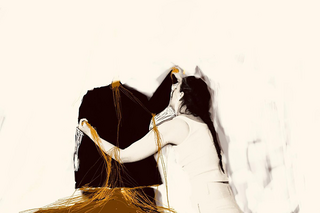Location: Miller Hall
406 Prospect Street
New Haven, CT 06511
Admission: Free
Open to: General Public
Description: Last Dance is a semi-improvised performance centered around a suspended sculpture. The performers partner the sculpture in a strange dance as they navigate its changing form. Visually inspired by Louise Bourgeois’ suspended works, the piece is a study of loss, cycles, and tipping points. How do we deal with irreversible change and the aftermath of loss? What happens when we face impossible choices? The performance will last approximately one hour and will be followed by a reception and a conversation between the artists and Yale faculty.
Feral Theatre For the past two decades, UK-based Feral Theatre co-directors Emily Laurens, Rachel Porter and Persephone Pearl have been making work together that is resilient, flexible, emphasises accessibility and focuses on real life struggles. Their work is multidisciplinary, tends to include clown, dark clown, and improvisation, is often site specific and sometimes closer to performance/live art. It is visual and experimental, including puppets, objects, paper, cloth, shadows, projections, live music and lighting. They have a long track record of making performance and ritual based work that:
- Explores the role of ritual in the context of current ecological realities and links the creation of new rituals and stories with contemporary environmental action (often with a focus on holding space for grief, gratitude and a wide range of other ecological emotions)
- Proposes that experimental contemporary ritual has a role in counterbalancing and queering an individualistic and consumption-focused dominant culture
- Evolves, responds to and articulates emerging scientific knowledge and cultural shifts
- Reflects on the meanings of and possibilities for the sacred amid secular and scientific understandings of the Anthropocene.
Feral Theatre’s performance work explores themes around biodiversity change and eco-emotions. They made the immersive Funeral for Lost Species in 2011 and founded Lost Species Day, a voluntary initiative that invites participants to host or attend memorials and events for extinct and critically endangered species, communities and places. Over the past decade, Feral Theatre has moved into a curatorial and facilitative role with Lost Species Day, steering the project away from its initial focus on endling stories towards a more intersectional, anti-racist and anti-colonial framing, amplifying diverse voices through its platforms. Lost Species Day has touched many thousands of people and influenced academics, institutions and social movements.
Following on from A Funeral For Lost Species, their play Triptych won Best New Play at Brighton Fringe 2012. They explored ambivalence and complexity using clown and physical humour in productions including Freaks of Nature and the Thylacine Tribute Cabaret, and used puppetry and video to animate and explore text by feminist historian of technoscience Michelle Murphy in Alterlife. As well as co-directing Feral Theatre, Rachel, Persephone and Emily all work separately, often with some level of collaboration and communication in their individual projects.
